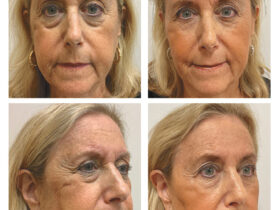By Robert C. Gibson
Managing Director Crossroads Behavioral Health Center and Crossroads Substance Abuse Services Group
Alcohol and substance abuse treatment facilities encompass a diverse range of programs and settings designed to address the complex needs of individuals struggling with addiction. Inpatient rehabilitation centers offer intensive, residential care where individuals reside for an extended period, typically ranging from 28 days to several months. These facilities provide a structured environment with round-the-clock support, counseling, and medical supervision. Outpatient treatment programs offer more flexibility, allowing individuals to receive therapy and support while still living at home. Detoxification centers focus on the initial phase of sobriety, providing medical supervision to manage withdrawal symptoms safely. Each type of facility addresses the multifaceted aspects of addiction, aiming to help individuals achieve and maintain sobriety through comprehensive and tailored approaches. Additionally, 12-step programs, such as Alcoholics Anonymous (AA) and Narcotics Anonymous (NA), are self-help groups that follow a structured set of guiding principles for recovery.
Crossroads Behavioral Health Center / Crossroads Substance Abuse Services Group, located at 708 Goodlette-Frank Road Naples, FL 34102, is a unique 90-dayintensive outpatient (IOP) treatment program that is tailored for each client’s needs. Crossroads has developed a proprietary curriculum that helps individuals seeking long term sobriety and aids in reaching their goals and dreams. Intensive outpatient treatment (IOP) is often considered the most effective and flexible form of treatment for alcohol and substance abuse disorders for several reasons. One key advantage is the flexibility it offers in terms of scheduling. Unlike inpatient programs that require individuals to reside at the facility, IOP allows participants to maintain their daily routines, such as work or school, while still receiving intensive treatment during specified hours. This flexibility makes it a practical option for those who cannot commit to a full-time residential program due to family or work responsibilities. Additionally, Crossroads offers tele-health therapy, that delivers the treatment program to clients unable to attend in-person therapy sessions.
Crossroads multifaceted approach that includes individual counseling, group therapy, and educational sessions, addresses the various aspects of addiction, providing a well-rounded support system for recovery. The program serves as a transitional step and guide to increased independence and returning to daily life. This continuity of care helps individuals maintain their progress and cope with the challenges of reintegration into society.
CROSSROADS TREATMENT PLANS:
CROSSROADS TIER 1 TREATMENT PROGRAM – is designed for individuals new to recovery. Its primary focus is maintaining long term sobriety. We identify everyone’s potential relapse triggers and develop alternative relapse skills. Our core beliefs are examined and broken down into fact or opinion. We set specific measurable goals for every client. Clients focus on identifying career goals and work with their therapist and counselor to find a pathway to reach their obtainable dreams. In addition to employment skills, we address housing, which is a current crisis in SWFL. Crossroads assist our graduates to team together and seek sober living housing, allowing individuals in early recovery to pool their resources and support each other in their road to recovery.
CROSSROADS TIER 2 TREATMENT PROGRAM – is designed specifically for professionals or retirees who recognize their increased drinking or drug use and want to make a change in their lives. Unfortunately, many of these individuals continue to suffer because they fear the stigma of recovery and often feel they are too old, or far along in their careers to set aside the time for a 30–60-day residential rehab program. At Crossroads we fully understand these concerns and apprehensions. An independent intensive outpatient program (IOP) addiction recovery program for professionals and retirees is crucial for addressing:
1. Confidentiality: Professionals and retirees are often hesitant to seek treatment for addiction in traditional rehab or outpatient programs due to concerns about confidentiality. A program specifically designed for professionals can provide a more discreet and confidential environment, which can increase the likelihood that they will seek and receive treatment.
2. Unique Needs: Professionals and retirees have unique needs and challenges in addiction recovery, including concerns about their careers or the impact of addiction on their reputations. Crossroads autonomous program addresses these needs and provides specialized support and resources for professionals in recovery.
3. Supportive Environment: Our program provides a supportive environment with others who face similar challenges and experiences. This helps our clients feel less isolated and increases their motivation to engage in treatment and maintain their sobriety.
4. Tailored Treatment: Our program provides tailored treatment that addresses the specific needs and challenges of professionals in recovery. This specialized program includes components such as stress management, career counseling, and relapse prevention strategies that are tailored to the unique needs of professionals.
CROSSROADS TIER 3 TREATMENT PROGRAM – is specifically oriented towards those individuals suffering from dual diagnosis. Dual diagnosis treatment, which refers to the treatment of co-occurring mental health and substance use disorders, can be challenging in addiction recovery for:
1. Complexity: Dual diagnosis cases are often more complex than cases of substance abuse alone, as the presence of a mental health disorder can complicate treatment and recovery efforts.
2. Misdiagnosis: It is often difficult to accurately diagnose both a mental health disorder and a substance use disorder, as symptoms of one disorder can mimic the symptoms of the other. This can result in misdiagnosis and a delay in appropriate treatment.
3. Treatment resistance: Individuals with dual diagnosis may be resistant to treatment or may struggle to engage in treatment due to the presence of anxiety, depression, or psychosis.
4. Stigma: There is often a stigma associated with both mental health disorders and substance abuse, which can make it challenging for individuals to seek and receive treatment for both conditions.
Crossroads dual diagnosis program involves medication management, behavioral therapy, and support groups. In addition, our individualized treatment plans address each person’s unique needs and challenges.
KEY ELEMENTS OF AN EFFECTIVE IOP TREATMENT PROGRAM
1. Individualized Treatment Plans: Each patient’s journey towards recovery is unique and requires a personalized approach. Crossroads has developed individualized treatment plans based on a thorough assessment of the patient’s addiction history, mental health, and overall health status. The plans are regularly reviewed and updated based on the patient’s progress.
2. Evidence-Based Therapies: Effective IOP programs provide evidence-based therapies such as cognitive-behavioral therapy (CBT), motivational interviewing, and dialectical behavior therapy (DBT). Crossroads integrates these therapies which are proven to be effective in treating addiction and co-occurring mental health disorders.
3. Group Therapy: Group therapy is an essential component of Crossroads IOP programs as it provides patients with a supportive community of peers who can relate to their struggles. Group therapy also allows patients to learn from each other and provides opportunities to practice healthy communication and relationship-building skills.
4. Medication-Assisted Treatment (MAT): MAT involves the use of medications such as anti-depressants, methadone, buprenorphine, or naltrexone to manage cravings, withdrawal symptoms, and diagnosed mental health issues during the recovery process. Crossroads IOP program offers MAT to patients who need it as part of their individualized treatment plan.
5. Holistic Care: A strong IOP program addresses the whole person, including their physical, emotional, and spiritual needs. Crossroads holistic care includes activities such as art therapy, meditation, yoga, boating, hiking, as well as other group outings and activities.
6. Family Involvement: Addiction affects not only the individual struggling with it but also their loved ones. Crossroads promotes the involvement of family members in the treatment process through family therapy and education.
7. Aftercare Planning: All IOP programs should prepare patients for the transition back to their daily lives by developing a comprehensive aftercare plan. Crossroads offers ongoing support such as continued therapy, support group meetings, and sober living arrangements as needed.
WHY IS CROSSROADS SUBSTANCE ABUSE CONSIDERED ONE OF THE PREMIERE INTENSIVE OUTPATIENT (IOP) TREATMENT PROGRAMS IN SW FLORIDA?
There are a few factors that contribute to an IOP treatment program’s reputation as a top program that is well-regarded in the field. One of the main factors is the program’s history of success in treating substance abuse and addiction. This is evidenced by the program’s outcome data, testimonials from former patients, or recognition from reputable third-party organizations in the field of addiction treatment.
Another crucial factor is the program’s adherence to evidence-based treatment practices, as well as its ability to provide individualized treatment plans to meet the unique needs of each patient.
Crossroads Substance Abuse Services Group maintains a highly qualified and experienced staff, including licensed therapists and medical professionals who are skilled in treating addiction and co-occurring mental health disorders. The program prioritizes ongoing support and aftercare planning to help patients maintain their sobriety and avoid relapse after completing the program. Overall, Crossroads, offers high-quality care and support tailored to each patient’s needs, along with a commitment to evidence-based treatment practices and ongoing support for long-term recovery.
REDEFINING CORE BELIEFS IN RECOVERY
At Crossroads we examine the core beliefs of each client. Core beliefs in recovery refer to the deeply held beliefs that individuals have about themselves, the world around them, and their place in it. These beliefs are often shaped by past experiences and can influence a person’s thoughts, feelings, and behaviors, including their ability to recover from addiction.
In the context of recovery from addiction, core beliefs may include beliefs about oneself, such as feelings of worthlessness or shame, or beliefs about others, such as distrust or fear of being judged. These core beliefs are often negative and may contribute to feelings of hopelessness or despair, which can make recovery more challenging.
As a result, one of the key objectives of recovery is to identify and challenge these negative core beliefs, replacing them with more positive and empowering beliefs that support recovery. At Crossroads, this involves working with a therapist or counselor to identify these beliefs and understand how they are impacting a person’s recovery.
By identifying and challenging negative core beliefs, individuals in recovery create a more positive mindset that supports their efforts to maintain sobriety. This involves practicing mindfulness, engaging in positive self-talk, and focusing on the present moment, rather than dwelling on past mistakes or negative thoughts. Through this process, individuals cultivate a sense of self-worth and empowerment, which help support their ongoing recovery journey.
THE IMPORTANCE OF REGAINING SELF-ESTEM IN RECOVERY:
Regaining self-esteem is an important aspect of recovery from addiction because addiction often causes individuals to feel a sense of shame, guilt, and worthlessness. These negative feelings often contribute to substance abuse and addiction relapse and make it challenging for individuals to achieve and maintain sobriety.
Regaining self-esteem in recovery involves rebuilding a sense of self-worth, self-respect, and self-confidence. At Crossroads, this involves working with a therapist or counselor to identify negative thoughts and beliefs that are contributing to feelings of shame and worthlessness. Through therapy, individuals can learn to challenge and replace these negative beliefs with more positive and empowering beliefs that support their recovery.
At Crossroads, self-esteem is improved through engagement in activities and behaviors that promote feelings of accomplishment, such as setting and achieving personal goals, volunteering, or pursuing new hobbies and activities. These behavioral changes help individuals develop a sense of purpose and meaning in their lives that help boost feelings of self-worth and confidence.
In addition, we strive to build and maintain healthy relationships with others that contribute to improved self-esteem. By surrounding oneself with supportive and positive people, clients can feel more valued, respected, and connected, which further boosts their sense of self-worth and self-esteem. By rebuilding self-esteem, individuals can improve their chances of achieving and maintaining sobriety over the long term.
UTILIZING COGNITIVE BEHAVIORAL THERAPY (CBT) IN RECOVERY
Crossroads IOP program is built upon the foundation of implementing cognitive-behavioral health therapy for long term alcohol and substance abuse recovery. Cognitive-behavioral therapy (CBT) is a form of psychotherapy that focuses on identifying and changing negative thoughts, beliefs, and behaviors. In the context of recovery from addiction, CBT is used to help individuals challenge and reframe negative thoughts and beliefs that contribute to substance abuse and addiction.
CBT is based on the idea that thoughts, feelings, and behaviors are interconnected and that changing one can impact others. At Crossroads, the therapist collaborates with the individual to identify negative thoughts and beliefs that may be contributing to addiction, including beliefs about self-worth, stress, or coping mechanisms. Once these negative thoughts and beliefs are identified, Crossroads therapists help the client develop strategies for challenging and replacing them with more positive, empowering thoughts and beliefs.
If you or a loved one is considering mental health or addiction treatment, emotions surrounding this decision can be quite complex and confusing. You may recognize that you are experiencing more than normal difficulties in your life. You may have persistent feelings of sadness, anxiety, or hopelessness- yet resistance is blocking you. You may acknowledge that substance use, or addictive behaviors are causing significant disruptions and emotional difficulties in your life, yet the resistance is strong. Crossroads is a gateway to a better healthier life, free of the dependence of alcohol and drugs.
Please feel confident to contact us at (239) 692.1020 to learn more about Crossroads and our programs. We strive to promote a safe and helpful environment that supports each individual’s unique journey to long term growth, well-being, and recovery.
Crossroads
Behavioral Health Center
(239) 692.1020 | www.CrossroadsFL.org









